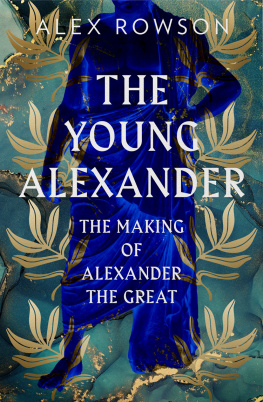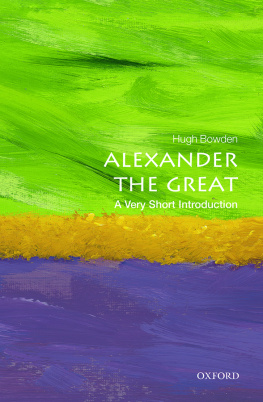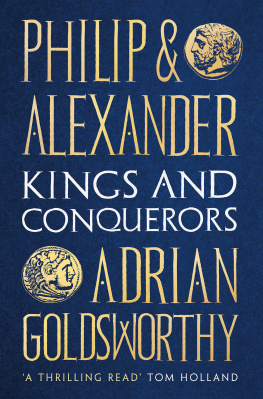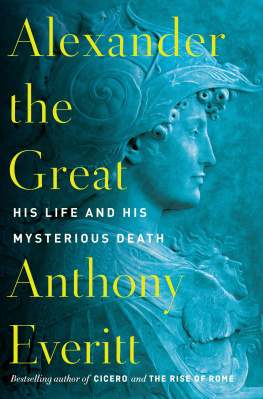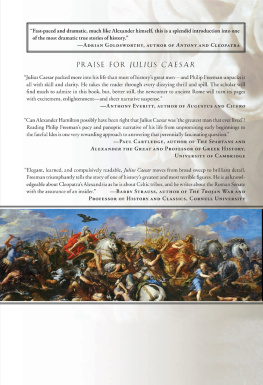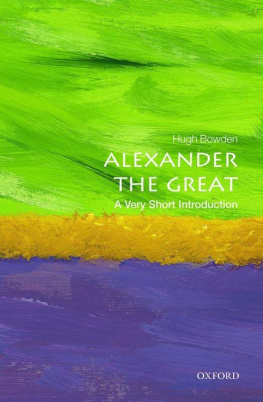Richard Stoneman is the author of several books on Greece and the classical tradition, including A Literary Companion to Travel in Greece (Penguin, 1984; reissued by the J. P. Getty Museum, 1994), Land of Lost Gods: The Search for Classical Greece (1987), Aquarian Guide to Greek Mythology (1991) and Daphne into Laurel (1982), a widely praised anthology of classical literatures reception into the English literary heritage through poetic translation and imitation. He has published Legends of Alexander the Great (Everyman, 1994) and is working on a general study of the Alexander traditions.
THE
GREEK ALEXANDER
ROMANCE

TRANSLATED WITH AN
INTRODUCTION AND NOTES BY
RICHARD STONEMAN
PENGUIN BOOKS
PENGUIN BOOKS
Published by the Penguin Group
Penguin Books Ltd, 80 Strand, London WC2R 0RL, England
Penguin Group (USA) Inc., 375 Hudson Street, New York, New York 10014, USA
Penguin Group (Canada), 90 Eglinton Avenue East, Suite 700, Toronto, Ontario, Canada M4P 2Y3
(a division of Pearson Penguin Canada Inc.)
Penguin Ireland, 25 St Stephens Green, Dublin 2, Ireland (a division of Penguin Books Ltd)
Penguin Group (Australia), 250 Camberwell Road,
Camberwell, Victoria 3124, Australia (a division of Pearson Australia Group Pty Ltd)
Penguin Books India Pvt Ltd, 11 Community Centre,
Panchsheel Park, New Delhi 110 017, India
Penguin Group (NZ), cnr Airborne and Rosedale Roads, Albany,
Auckland 1310, New Zealand (a division of Pearson New Zealand Ltd)
Penguin Books (South Africa) (Pty) Ltd, 24 Sturdee Avenue,
Rosebank, Johannesburg 2196, South Africa
Penguin Books Ltd, Registered Offices: 80 Strand, London WC2R 0RL, England
www.penguin.com
This translation first published 1991
5
Copyright Richard Stoneman, 1991
All rights reserved
The moral right of the translator has been asserted
Except in the United States of America, this book is sold subject
to the condition that it shall not, by way of trade or otherwise, be lent,
re-sold, hired out, or otherwise circulated without the publishers
prior consent in any form of binding or cover other than that in
which it is published and without a similar condition including this
condition being imposed on the subsequent purchaser
EISBN: 9780141907116
To Geoffrey de Ste Croix
and for my son Alexander
CONTENTS

ACKNOWLEDGEMENTS

I am grateful, as ever, to the various libraries I have used for the plenty of their resources in particular, the London Library, indispensable support of the wandering scholar, and the Library of the Institute of Classical Studies. Especial thanks are owed to Professor Waldemar Heckel and Professor Peter Parsons, both of whom read the Introduction and made many valuable suggestions for its improvement. Any errors that remain are of course my own.
The book is dedicated to my undergraduate tutor, Geoffrey de Ste Croix, who first introduced me to the historical Alexander. He will, I am sure, have firm views as to which Alexander the historical one or he of the Romance is of the more abiding importance and interest.
INTRODUCTION

ALEXANDER THE GREAT IN HISTORY AND LEGEND
When Marco Polo visited the city of Balkh, ancient Bactra, Mother of Cities, Paradise of the Earth, his hosts still spoke of the marriage that had taken place there between Alexander the Great and Roxane, the daughter of Darius, king of Persia. Not much further on, in Badakhshan, the Venetian traveller was told of horses for which was claimed a direct line of descent from Alexanders horse Bucephalus: They were all born like him with a horn on the forehead. This breed was entirely in the possession of one of the kings uncles, who, because he refused to let the king have any, was put to death by him. Thereupon his wife, to avenge her husbands death, destroyed the whole breed, and so it became extinct.
It was not only the horses whose ancestry was legendary. Many of the kings of Bactria, Derwauz and neighbouring regions claimed descent from Alexander the Great.
These examples are chosen to illustrate the power of legend over the minds of men, the longevity of the name of Alexander over two millennia, and also the unimportance of historical fact for the endurance of a great name. Alexander never married the daughter of Darius, and the kings claims could not be other than fiction. He did marry Roxane, but she was a Sogdian princess and not a Persian. No historian claims her for a daughter of Darius; that piece of legend is due directly to the Alexander Romance.
It is not only on such dynastic claims that the Romance had an impact. The legends of Alexander entered a common stock of central Asian lore through the manifold translations and retellings of the legend. Visitors to English cathedrals such as Wells and Gloucester will recognize in the Romance the source of frequent representations on misericords, roof bosses and the like of scenes of Alexanders flight into the heavens. His name is known in Malaya and in Russia, in Israel and in Spain.
It would hardly be an exaggeration to say that the legends of Alexander are as widely disseminated, and as influential on art and literature, as the story of the Gospels. Each age makes its own Alexander: the Hebrew tradition makes him a preacher and prophet, the later Christian Greek and Syriac versions emphasize his faithful obedience to God; in the European Middle Ages he is an exemplar of the chivalrous knight; for the Persians he is, in one tradition, the arch-Satan because he destroyed the fire-altars of the Zoroastrian religion, and the talking trees called waq-waq trees in the Syriac versions share the name of the legendary islands of Waq-Waq in the Arab tales.


